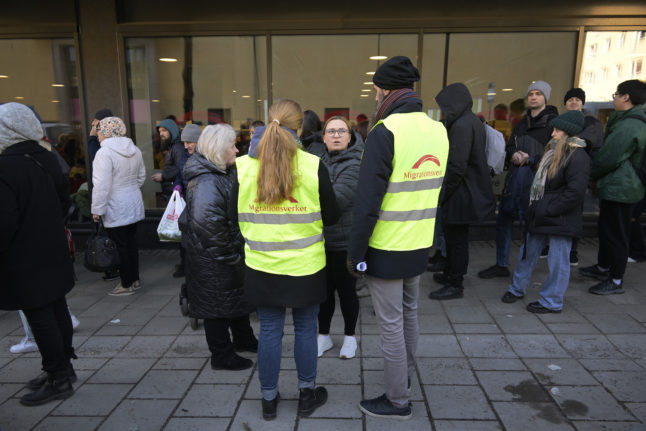They are eligible for the less powerful coordination number or samordningsnummer, but are effectively unable to access Swedish society on the same conditions as immigrants who hold a personal number.
“This severely limits the possibilities for Ukrainians’ development, securing a normal life in Sweden and even normal healthcare,” Khrystyna Hevchuk, the woman behind the petition, wrote.
“Therefore, we want to petition for Ukrainian refugees in Sweden to be given a personal number, meaning that people who leave their homes due to the war can feel stability again.”
“We have lived in Sweden for more than a year without stability, without knowing how things will be tomorrow. Where are we going to live? Can we find a job? Are our children going to be able to adapt to the new society? So many answers, but so few questions.”
In order to qualify for a personal number, immigrants to Sweden need to prove that they will be living in Sweden for at least a year, by providing a work permit, residence permit or study permit of sufficient length, for example.
Refugees in Sweden who have applied for asylum under the usual route are not eligible for a personal number either, but once their asylum request is granted, they are usually granted a three-year residence permit, which enables them to register for a personal number.
READ ALSO:
- Is life in Sweden impossible without a personal number?
- Things you can (and cannot) do without a Swedish personal number
- Five top tips if you don’t have a personal number in Sweden
What’s happening with the petition?
Last week, the deadline for collecting signatures passed, with the petition garnering a total of 4,532 signatures and 2,464 comments. According to an update on the petition website, it has now been sent to all MPs, the Ministry of Justice and the migration minister’s secretary, and the organisers of the petition hope to meet with supportive MPs soon.
Social Democrat MP Kadir Kasirga submitted an official question on the matter to Migration Minister Maria Malmer Stenergard, who responded on Wednesday.
“The framework on the rules for people offered temporary protection in Sweden were set over 20 years ago, when the so-called temporary protection directive was implemented into Swedish law,” Stenergard wrote.
“It has for the most part worked well, and has enabled Sweden to receive many people from Ukraine in a short period of time. In some areas, its application has not however been satisfactory, and the government has taken measures to improve the situation for people with temporary protection.”
Some examples of this are, according to Stenergard, enabling Ukrainians to take part in SFI, Swedish and Swedish as a second language courses in Komvux adult education centres.
Last spring, the government asked the UN’s International Organisation for Migration (IOM) to investigate Ukrainains’ situation in Sweden. This was presented in June, and the government are now assessing relevant measures which could be taken.
“It should however be emphasised that possible changes to a framework which is already in place are complicated and will take time,” she wrote.
What issues are there for Ukrainians who can’t get personal numbers?
Some of the issues outlined in the petition include problems finding housing, studying Swedish, and taking driving tests, which can limit Ukrainians’ job opportunities.
There are also issues with validating diplomas from Ukraine, accessing healthcare, opening a bank account or using BankID, which has the knock-on effect of making it almost impossible to buy items or flight tickets online.
“Every time we hear the words ‘what’s your personal number’ or ‘open BankID’, we feel like we are worth less than others, as we are forced to answer ‘we don’t have that’ and hear the words of rejection again,” Hevchuk wrote.
Ukrainian refugees cannot pay invoices or transfer money either – the cards they are issued from the Migration Agency, which is loaded with 61 kronor per day, only allows them to withdraw money from cashpoints or pay for purchases in physical shops.
“This list could continue for a long time,” the petition reads. “The last thing which should be taken into consideration by Swedish authorities is that Ukrainian children are not required to go to school.”
“Just think what the result will be in 10-15 years, and how these children, who are going to grow up without knowing the language or anything about Swedish society, are going to adapt, get a job and not become criminals.”
“We don’t want much, we just want equality.”



 Please whitelist us to continue reading.
Please whitelist us to continue reading.
Same problem in North America.
Some people wonder if they should return home after the war to rebuild their nation.